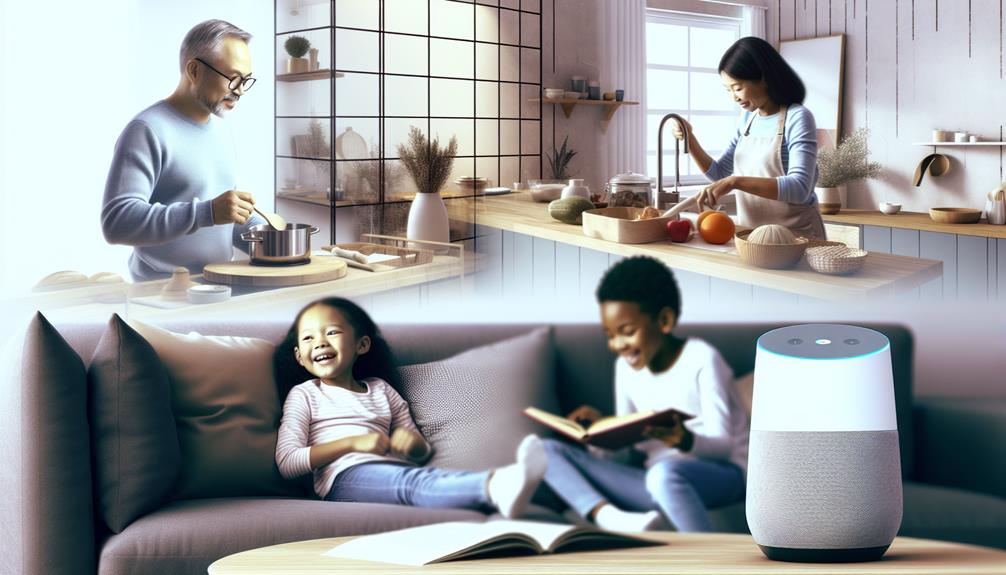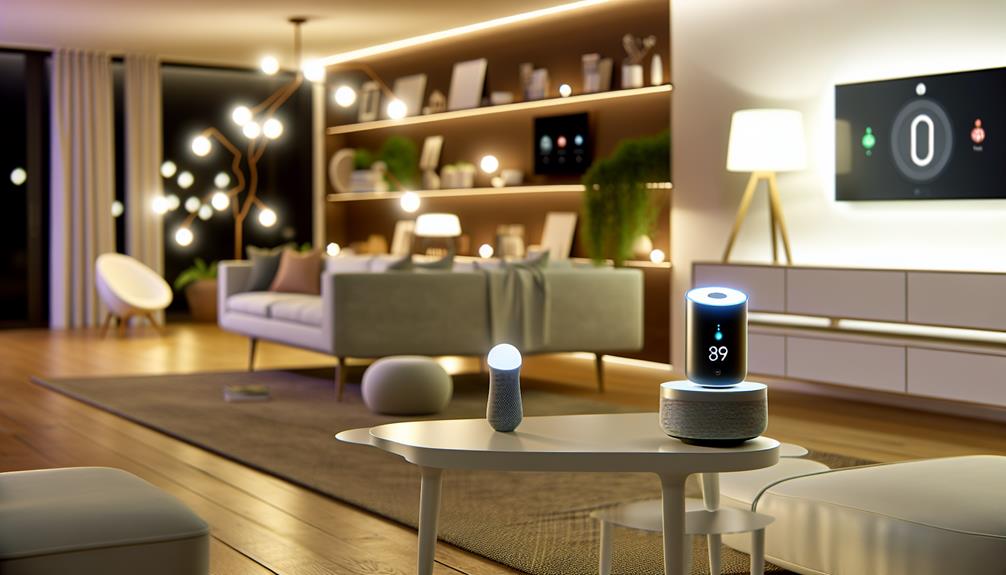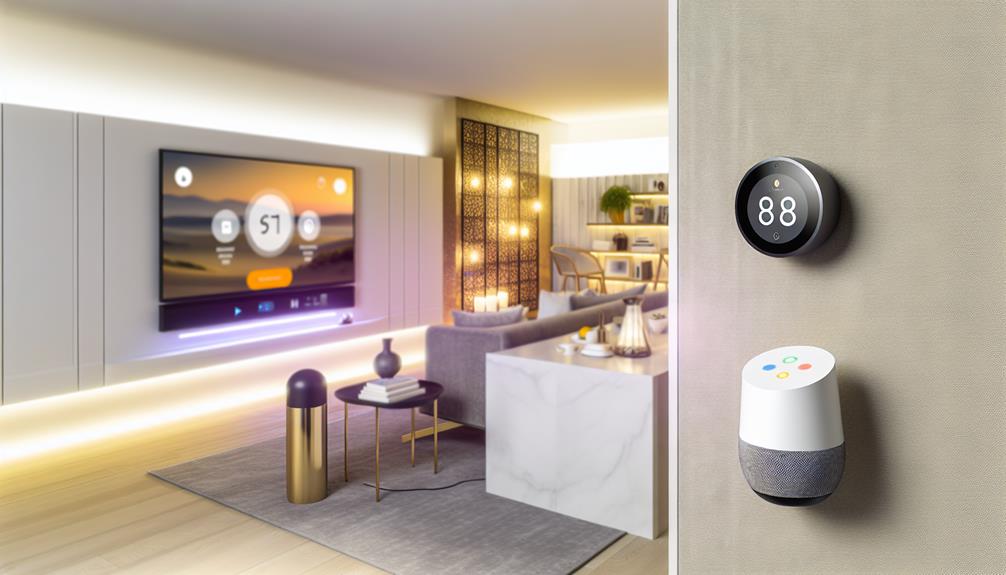What Are the Advantages of AI Home Assistants?
AI home assistants have emerged as pivotal tools in modern households, offering a multitude of advantages that enhance daily living. From streamlining mundane tasks to facilitating energy efficiency, these devices promise to transform the way we interact with our home environments. Their ability to provide personalized experiences and integrate seamlessly with various smart technologies not only fosters convenience but also heightens security measures. As we explore these benefits further, one must consider the implications of such reliance on technology and how it shapes our future domestic landscapes.
Key takeaways
- AI home assistants enhance convenience by managing schedules, reminders, and smart devices remotely for seamless daily organization.
- They improve energy efficiency by monitoring consumption patterns and automating adjustments to reduce utility costs.
- Personalized user experiences are fostered through learning user behavior, offering tailored recommendations and interactions.
- Advanced security features like facial recognition and remote monitoring ensure home safety and sensitive data protection.
- Voice-activated control and automation streamline tasks, enhance user interaction, and save time in daily routines.
Enhanced Convenience
In today's fast-paced world, convenience is a prized commodity, and AI home assistants exemplify this trait by seamlessly integrating into daily life. These devices transform the traditional concept of a smart home, offering robust user customization that caters to individual preferences and lifestyles.
By enabling daily organization, AI assistants streamline tasks such as managing schedules, setting reminders, and even coordinating family activities, guaranteeing that everyone stays connected and informed.
Accessibility features are particularly beneficial, allowing users of all ages and abilities to engage with technology effortlessly. With voice personalization, family members can interact with their home assistant using natural language, fostering a sense of belonging and comfort.
Remote management capabilities further enhance convenience, as users can control various smart devices from anywhere, creating an interconnected environment.
Moreover, multi-device interaction guarantees that AI home assistants can seamlessly communicate with other smart devices, enhancing the overall user experience. This integration not only simplifies daily routines but also strengthens family coordination.
Ultimately, the enhanced convenience offered by AI home assistants makes them indispensable tools for modern living, providing a sense of control and ease that resonates with today's busy households.
Improved Energy Efficiency
Harnessing the power of AI home assistants can lead to significant improvements in energy efficiency, transforming how households manage their power consumption. By integrating smart thermostats, these systems can intelligently adjust climate control settings based on real-time data, ensuring ideal comfort while minimizing energy waste.
Energy monitoring capabilities allow users to track their consumption patterns, providing valuable insights into usage analytics that highlight areas for potential savings. With load enhancement features, AI home assistants can manage energy distribution across devices, avoiding peak usage times and reducing overall costs.
Furthermore, consumption forecasting enables households to anticipate their energy needs, aligning their usage with renewable integration strategies. This not only supports sustainability but also enhances the all-encompassing efficiency of energy resources.
Utility tracking functionalities provide a thorough view of energy bills, empowering users to make informed decisions that promote smarter consumption habits.
By leveraging these advanced technologies, AI home assistants foster a sense of community among users aiming for energy conservation, creating a collective impact on reducing carbon footprints and promoting sustainable living practices.
Embracing these innovations ultimately leads to a more efficient, environmentally friendly home.
Personalized User Experience
The integration of AI home assistants not only enhances energy efficiency but also markedly elevates the personalized user experience. These advanced systems learn from user behavior, allowing them to provide customized interactions that cater to individual preferences and routines. By analyzing patterns in voice commands, daily schedules, and even mood, AI home assistants can adapt their responses and recommendations, creating a more intuitive and tailored engagement.
For instance, an AI home assistant can suggest recipes based on dietary preferences or remind users of important tasks based on past behavior. This level of personalization fosters a sense of belonging, making users feel understood and valued. As people increasingly seek connections in their digital interactions, AI home assistants bridge the gap by offering a familiarity that resonates with daily life.
Moreover, the ability to customize interactions cultivates a unique relationship between the user and the assistant, enhancing overall satisfaction. With continuous updates and learning capabilities, these systems evolve alongside the user, ensuring that the experience remains relevant and engaging.
Ultimately, the personalized user experience offered by AI home assistants not only simplifies routines but also enriches the emotional landscape of home living.
Seamless Integration With Devices
AI home assistants excel in their ability to seamlessly integrate with a wide array of smart devices, creating a cohesive ecosystem that enhances everyday living. This integration allows users to control lighting, heating, security systems, and entertainment from a single interface, greatly simplifying daily routines.
As smart home ecosystems continue to evolve, the convenience of managing multiple devices through voice commands or mobile applications fosters a sense of belonging and comfort within the home.
However, users may encounter device compatibility challenges when trying to unify an assortment of products from different manufacturers. To address this, leading AI home assistants prioritize compatibility with a broad spectrum of devices, ensuring that users can enjoy a harmonious smart home experience.
This commitment to integration not only elevates user satisfaction but also encourages the adoption of new technologies within households.
Ultimately, the seamless integration provided by AI home assistants transforms homes into intelligent environments where technology works in concert, empowering users to create personalized and efficient living spaces.
Advanced Security Features
Smart home security has been revolutionized by the incorporation of advanced features in AI home assistants, providing homeowners with enhanced protection and peace of mind.
These systems utilize facial recognition technology to identify individuals entering your home, guaranteeing that only authorized users gain access. Coupled with smart monitoring capabilities, AI assistants can continuously assess the security status, alerting homeowners through instant notifications when unusual activity is detected.
Remote access features allow users to control their security systems from anywhere, providing a layer of convenience and confidence. Intrusion detection mechanisms work in real-time to identify potential threats, while user authentication guarantees that only designated individuals can access sensitive information or control security settings.
In emergencies, AI home assistants can trigger rapid emergency response protocols, coordinating with local authorities to enhance safety.
To protect personal data, advanced data encryption methods safeguard sensitive information, and activity logging provides a clear record of interactions with the system.
Access control features allow homeowners to set specific permissions for different users, guaranteeing a tailored security approach that fosters a sense of belonging and community safety.
Together, these advanced security features create a secure environment for families, enhancing overall well-being.
Voice-Activated Control
Voice-activated control has emerged as a transformative feature in modern home automation, allowing users to interact seamlessly with their devices through simple voice commands. This advancement leverages natural language processing (NLP) technology, enabling AI home assistants to understand and respond to human speech in an intuitive manner.
The result is a more engaging and user-friendly experience that fosters a sense of belonging within the smart home ecosystem.
Key benefits of voice-activated control include:
- Enhanced Accessibility: Users of all ages and abilities can easily communicate with their devices, making smart home technology more inclusive.
- Hands-Free Convenience: Voice commands free users from needing to physically interact with devices, ideal for multitasking or when hands are occupied.
- Improved User Interaction: Natural dialogue capabilities allow for more natural conversations with devices, creating a more personalized and connected experience.
Time-Saving Automation
Time-saving automation has become a cornerstone of modern living, offering users the ability to streamline daily tasks and enhance productivity. AI home assistants exemplify this shift by integrating smart scheduling and routine efficiency into everyday life. By intelligently managing calendars, these devices help users prioritize their commitments, ensuring that important tasks are completed without the stress of oversight.
With smart scheduling, AI home assistants can automatically arrange appointments, send reminders, and even adjust plans based on changing circumstances, making it easier than ever to stay organized.
Routine efficiency takes this a step further, allowing individuals to customize their daily activities, from managing household chores to setting ideal times for relaxation or exercise.
This level of automation fosters a sense of control and belonging, as users can create a harmonious environment tailored to their unique lifestyles. By reducing the time spent on mundane tasks, AI home assistants empower individuals to focus on what truly matters, whether it's nurturing relationships or pursuing personal interests.
Ultimately, the integration of time-saving automation into our lives not only enhances productivity but also enriches our overall well-being.
Continuous Learning and Adaptation
Continuous learning and adaptation are fundamental features of AI home assistants that greatly enhance user experience.
By analyzing user behavior and preferences, these systems provide personalized interactions, increasing overall task efficiency and improving voice recognition capabilities.
As a result, AI home assistants become more intuitive over time, catering to the unique needs of each household.
Personalized User Experience
Artificial intelligence home assistants excel in delivering a personalized user experience by continuously learning and adapting to individual preferences and behaviors. This capability fosters a sense of belonging, creating an environment where users feel understood and valued.
Through advanced algorithms, these assistants engage in user preference tracking, allowing them to tailor their functionalities to suit unique household needs.
The benefits of this personalized approach include:
- Customized Interactions: AI home assistants can modify their communication styles and responses based on user interactions, ensuring that conversations feel natural and relevant.
- Proactive Recommendations: By analyzing past behaviors and preferences, these systems can suggest timely reminders or helpful tips, enhancing daily routines without intrusiveness.
- Enhanced Comfort: Users can enjoy a seamless experience, as AI home assistants adjust settings—such as lighting, temperature, and entertainment—based on learned preferences, promoting a cozy atmosphere.
In essence, the personalized user experience offered by AI home assistants not only enriches interactions but also cultivates a deeper connection between technology and its users, fostering a more harmonious living environment.
Enhanced Task Efficiency
Enhancing task efficiency through AI home assistants involves the ability to learn and adapt to users' routines and preferences over time. This continuous learning process allows these intelligent systems to implement effective task prioritization strategies, ensuring that the most important actions are addressed promptly.
By analyzing user behavior and feedback, AI home assistants can intelligently adjust their recommendations, thereby creating a more customized experience that resonates with users' needs.
Moreover, workflow optimization techniques are seamlessly integrated into daily activities, simplifying complex tasks and minimizing time spent on routine chores. For instance, an AI home assistant can schedule reminders, manage home appliances, and even coordinate with other smart devices to streamline operations.
This holistic approach not only reduces the cognitive load on users but also fosters a sense of belonging through improved household harmony.
As individuals increasingly rely on these technologies, the potential for enhanced task efficiency becomes a cornerstone of modern living. Embracing AI home assistants means embracing a lifestyle that prioritizes efficiency, organization, and personal empowerment, ultimately enhancing the quality of everyday experiences.
Improved Voice Recognition
The effectiveness of AI home assistants heavily relies on their improved voice recognition capabilities, which are driven by continuous learning and adaptation. This advancement allows these systems to better understand user commands and context, fostering a more seamless interaction between humans and technology.
As AI learns from user interactions, it develops a deeper contextual understanding and enhances its ability to recognize emotional tones in speech.
Key advantages of improved voice recognition include:
- Personalized Responses: By adapting to individual speech patterns and preferences, AI assistants can provide tailored suggestions and commands.
- Increased Accuracy: Continuous learning reduces misunderstandings, allowing for more precise execution of tasks.
- Emotional Recognition: Enhanced capabilities enable AI to identify emotional cues, fostering a more empathetic and relatable interaction.
As these systems evolve, users can expect a more intuitive and engaging experience, reinforcing a sense of belonging in their interactions with technology.
The ongoing development of voice recognition not only improves functionality but also enriches the emotional connection users feel with their AI home assistants, making everyday tasks feel more personal and human-like.
Cost-Effective Home Management
AI home assistants play a pivotal role in cost-effective home management by considerably reducing utility expenses through optimized energy usage.
Additionally, their ability to automate routine tasks translates into valuable time savings for homeowners.
This combination not only enhances efficiency but also contributes to a more sustainable living environment.
Reduced Utility Expenses
Smart home technology has revolutionized the way households manage their energy consumption, leading to significant reductions in utility expenses. One of the key advantages of AI home assistants is their ability to optimize energy usage through smart thermostat benefits and advanced energy consumption tracking.
By integrating these systems, homeowners can monitor and control their energy use more effectively, ensuring that they are not overspending on utilities.
The following features contribute to reduced utility expenses:
- Automated temperature adjustments: Smart thermostats learn your schedule and preferences, adjusting heating and cooling automatically to avoid energy waste.
- Real-time energy monitoring: AI assistants provide insights into energy consumption patterns, enabling users to identify high-usage appliances and make informed decisions.
- Customizable settings: Tailor energy-saving settings to fit your lifestyle, ensuring that your home remains comfortable while minimizing costs.
Time-Saving Automation Tasks
Enhancing home management, time-saving automation tasks are a standout feature of AI home assistants. These intelligent devices streamline daily activities, allowing households to function more efficiently and freeing up valuable time for family and personal pursuits. By incorporating smart scheduling, AI home assistants can manage appointments, reminders, and even grocery lists, ensuring that important tasks are never overlooked.
Routine efficiency is another significant benefit, as these systems learn user preferences and habits over time. This capability enables them to suggest and automate tasks such as adjusting thermostats, turning lights on and off, or initiating household chores at ideal times.
As a result, families can enjoy a more organized and harmonious living space, which fosters a sense of belonging and community. Moreover, the ability to integrate with other smart devices enhances the overall experience, creating a seamless network of home management solutions.
Frequently Asked Questions
Can AI Home Assistants Help With Daily Meal Planning?
AI home assistants can greatly enhance daily meal planning by providing personalized recipes tailored to dietary preferences and restrictions. Additionally, they streamline grocery management, ensuring efficient shopping lists and minimizing food waste for a more organized kitchen experience.
Are There Privacy Concerns With Using AI Home Assistants?
Privacy concerns regarding AI home assistants largely center on data security and user consent. Users must be vigilant about the information shared, as improper handling of personal data can lead to significant privacy breaches and potential misuse.
How Do AI Home Assistants Handle Multiple User Profiles?
AI home assistants utilize advanced voice recognition technology to identify different users, enabling personalized interactions. This user customization enhances the experience by tailoring responses and services, fostering a sense of belonging and connection within the household.
Can AI Home Assistants Integrate With Smart Home Security Systems?
AI home assistants can seamlessly integrate with various smart home security systems, enhancing overall home safety. Their compatibility guarantees users can monitor and control security features conveniently, fostering a sense of security and belonging within their environment.
What Happens if the Internet Goes Down?
When the internet goes down, AI home assistants can still perform limited offline functionality. Users can execute local commands for basic tasks, although advanced features reliant on internet connectivity may become unavailable until service is restored.



